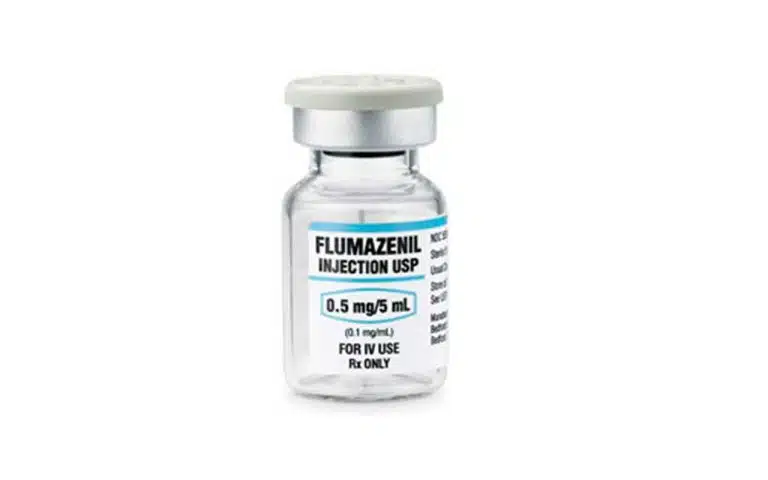How Flumazenil Works As A Benzodiazepine Antidote
- Causes Of Benzodiazepine Overdose
- Treating An Overdose With Flumazenil
- Effects Of Flumazenil
- Benzo Withdrawal Syndrome

Benzodiazepines are a class of prescription drugs commonly used to treat anxiety and insomnia disorders. Although they are generally safe to take as prescribed, large doses can result in a benzodiazepine overdose.
Flumazenil is an FDA-approved medication used by medical professionals that can reverse the effects of a benzodiazepine overdose. Flumazenil works as an antidote by inhibiting the effects of benzodiazepines on the central nervous system.
Causes Of Benzodiazepine Overdose
Benzodiazepines (benzos) increase the neurotransmitter gamma-aminobutyric acid (GABA) after binding to benzodiazepine receptors in the brain. This helps increase relaxation and reduce symptoms related to anxiety and insomnia.
However, benzos are central nervous system (CNS) depressants that slow the body’s functions. These functions include breathing, heart rate, and blood pressure. When taken in high doses, benzos can cause severe respiratory depression.
Respiratory depression is characterized by slowed breathing and can be life-threatening if untreated.
Along with difficulty breathing, other signs of a benzo overdose may include:
- bluish fingernails or lips
- confusion
- dizziness
- ataxia (impaired coordination)
- drowsiness
- weakness
- coma
- hypotension (low blood pressure)
If you suspect a loved one of experiencing a benzodiazepine overdose, seek medical attention immediately.
Treating A Benzo Overdose With Flumazenil
Flumazenil, also known as Romazicon, is a benzodiazepine antagonist, which means it reverses and blocks the effects of benzodiazepine agonists. It can also be used to reverse the postoperative effects of benzos that are used as anesthetics.
Benzodiazepine agonist drugs include:
- alprazolam (Xanax)
- lorazepam (Ativan)
- diazepam (Valium)
- oxazepam (Serax)
- temazepam (Restoril)
- triazolam (Halcion)
- midazolam (used for sedation in surgery)
Flumazenil is given as an intravenous (IV) infusion that inhibits the activity of benzos and reverses the binding of benzos from benzodiazepine receptors. In addition to flumazenil, healthcare clinicians may also intubate the person to help open the airway and assist breathing.
The drug may take up two minutes to improve symptoms of benzodiazepine toxicity. Most people respond within the first three minutes of receiving the medication. However, repeated dosing may occur if the person does not regain consciousness.
Flumazenil may have a duration of action of up to 50 minutes, depending on the amount of benzos in the body.
Mixed Overdose
Flumazenil works effectively on drug overdoses that are caused by benzodiazepines. However, benzos are commonly combined with other depressant drugs. If an overdose is caused by multiple drugs, flumazenil will not work.
The following drugs can cause similar overdose symptoms but cannot be treated with flumazenil:
- alcohol (ethanol)
- barbiturates (phenobarbital)
- opioids (oxycodone)
- z-drugs (sedative-hypnotics like Ambien)
Adverse Effects Of Flumazenil
Although flumazenil is beneficial for reversing a benzo overdose, there is a risk of experiencing adverse events.
Possible side effects following flumazenil administration include:
- confusion
- agitation
- changes in mood
- sedation
- seizure
- slow or rapid heart rate
- impaired cognition
In addition, people who are physically dependent on benzodiazepines may have an increased risk of experiencing immediate withdrawal symptoms after receiving flumazenil.
Some people use benzos as anticonvulsants, which also increases the risk of experiencing seizures upon withdrawal.
Benzo Withdrawal Syndrome
Benzos are recommended for short-term treatment because of the high risk of dependence and withdrawal syndrome. Once your body becomes physically dependent on benzos, you will likely experience withdrawal if you suddenly stop taking them.
Withdrawal can also be instigated by the use of flumazenil because it stops the effects of the drug. When someone overdoses on benzos and is given flumazenil, they may be irritable and anxious when they regain consciousness.
Benzo withdrawal can be dangerous and may cause seizures in some people. High doses and long-term benzodiazepine use increase the risk of experiencing seizures during withdrawal.
During benzo withdrawal, you may also experience the following symptoms:
- insomnia
- restlessness
- tremors
- headache
- nausea
- vomiting
- abdominal cramps
The risk of experiencing flumazenil-induced withdrawal depends on how long you’ve been taking benzos and if your body is physically dependent. Seizures can also occur in people who have been given flumazenil and are on certain antidepressant medications.
If you or a loved one would like more information about treating benzo withdrawal or benzo addiction, please contact Ark Behavioral Health today.
Written by Ark Behavioral Health Editorial Team
©2024 Ark National Holdings, LLC. | All Rights Reserved.
This page does not provide medical advice.
Food And Drug Administration (FDA) - Romazicon (Flumazenil) Injection
National Center For Biotechnology Information (NCBI) - Flumazenil
National Library of Medicine: MedlinePlus - Diazepam Overdose
PubMed - Flumazenil- An Antidote For Benzodiazepine Toxicity
Questions About Treatment?
Ark Behavioral Health offers 100% confidential substance abuse assessment and treatment placement tailored to your individual needs. Achieve long-term recovery.
100% confidential. We respect your privacy.
Prefer Texting?
Our friendly support team is here to chat 24/7. Opt out any time.







 Learn More
Learn More








